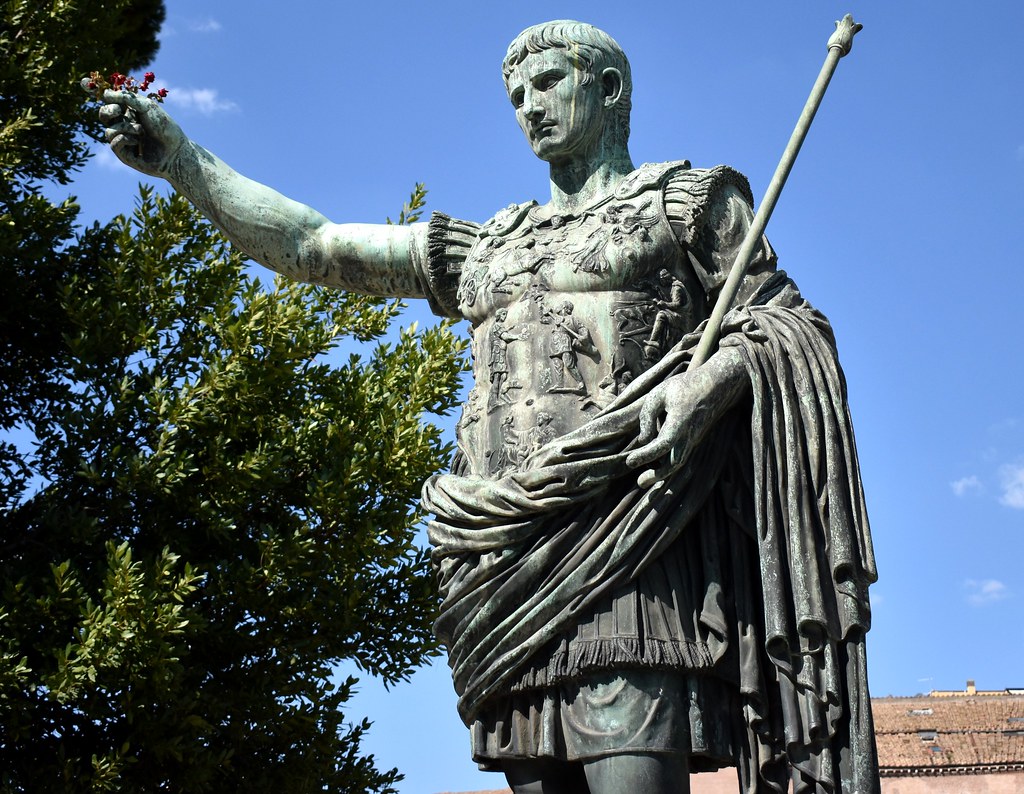
Throughout this season of Advent our focus is “The Story of Christmas in 20 Words.” On each of the 20 weekday mornings ending on Christmas Eve, we’ll spotlight a single word from the Gospel accounts that helps us ponder more deeply the birth of Jesus.
2. Augustus
Two thousand years ago, the classical world of the Greeks and Romans yearned for a savior.
Rich and poor alike lived in the hope that a great figure might somehow emerge to bring peace, order, and justice. The Roman poet Virgil expressed such hopes dramatically:
Now is the time sung by [the prophets]
When the wheel of the ages starts afresh.
Now is the Virgin herself made known
And the reign of Saturn on the earth.
Now is a child engendered by heaven
Smile…at the birth of this boy.
[He] will put an end to our wretched age,
From whom golden people shall spring.
Virgil was thrilled to announce the identity of this long-awaited “child engendered by heaven.”
It was Gaius Octavianus, the adopted son and successor of Julius Caesar, who would ultimately take the name Caesar Augustus (“the Exalted One”).
Augustus was the first Imperator, or supreme leader, of the Roman Empire. Barely 30 years old when came to power in 31 B.C., he ruled virtually all of the Mediterranean world and its surrounding territories for 45 years. That included the backwater province of Palestine, where during his reign a baby would be born to a Jewish peasant girl in the village of Bethlehem.
For a while Augustus pretended to be a regular guy. He identified himself as the First Citizen of the old Roman Republic. But it quickly became apparent he would rule as a committee of one. No potential rivals would get a sniff of his authority or his acclaim.
The historian Thomas Cahill points out that Augustus displayed all the hallmarks of a ruthless dictator. He was “a politician of labyrinthine cunning, difficult, delusional, and cruel.” Those who knew him either hated him or feared him. Or both.
All things considered, he proved to be a superb administrator. He expanded the borders of the empire and established important new cities. His reign marked the beginning of the so-called Pax Romana, a 200-year period of relative peace. As the Roman historian Tacitus observed, however, the Roman definition of peace was the quietness that came after the complete destruction of a nation – not unlike the peace that Marvel Comics bad guy Thanos enjoys after snapping his fingers and eliminating half the souls in the universe.
Augustus welcomed Virgil’s movement that declared him to be the Coming One.
He commissioned a statue of himself in the Roman forum that was 11 times the size of a normal human being. After all, he was not a normal human being. He was divine. Like all gods, he should be worshiped.
Jesus was born into Augustus’ world. For something like the first 19 years of his life, he lived under the fist of an autocrat who lived 1,500 miles away.
But in a twist that would have seemed incomprehensible to the emperor, it would turn out that Augustus was actually living in Jesus’ world. He just didn’t know it.
Today the only thing that remains of Augustus’ fabulous statue (what you see above is a modest reconstruction) is a single finger. It’s currently on display in the Forum of Rome. The name “Caesar” adorns pizza franchises, a creamy salad dressing, casinos, a popular sports gambling app, and not a few pet dogs. But that’s about it.
Augustus’ admirers left behind detailed descriptions of his eyes, his nose, and his hair. We know exactly how tall he was. His face adorns countless thousands of ancient coins. By contrast, no one has the faintest idea what Jesus looked like. There is not a single physical description of him in the New Testament. Yet Jesus has appeared in more works of art than any other figure in history – and everyone seems to know exactly who he is when they see him.
Even though Augustus was arguably one of the most important figures of the ancient world, he is mentioned only once in the Bible:
“In those days Caesar Augustus issued a decree that a census should be taken of the entire Roman world” (Luke 2:1). By ordering every head of household in the empire to “return to his hearth” (for the purpose of adjusting tax rates), he unwittingly helped fulfill the prophecy of Micah 5:2 that God’s Messiah would be born in Bethlehem.
On his deathbed, Augustus uttered famous last words: “Have I played the part well? Then applaud as I exit.” All the way to the end, he was quite taken with himself.
He must have found it satisfying to die in the middle of August, since the Roman Senate had literally named the month after him.
But it would have been jarring for him to realize that future ages would have no clue that he died in the year 767 A.U.C. (Ab Urbe Condita, “from the founding of the City”) – the Roman way of reckoning the passing of time.
Instead, children would be taught that he died on August 19, A.D. 14 (Anno Domini, “in the year of the Lord”) – all because of some Nobody from Nowheresville whose birth he could not possibly have noticed.
But that is one of the hidden lessons of Christmas.
As Jesus would point out years later, “The first shall be last, and the last shall be first” (Matthew 20:15-16).
Even if you’re pretty sure you’re king of the world.
